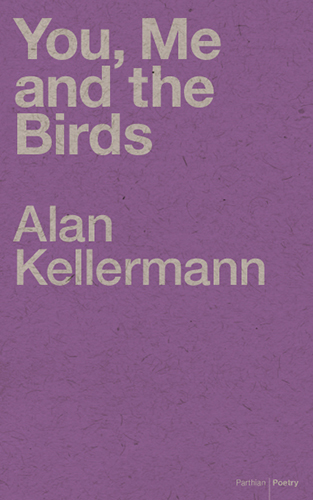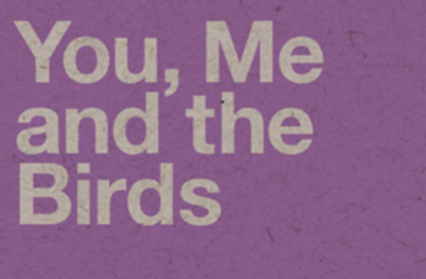Carl Griffin reviews You, Me and the Birds, a poetry collection by American debutant Alan Kellermann, touching on themes of love and human connection.
Like Mary Norton’s little beings, American debutant Alan Kellermann borrows rather than steals; surviving on age-old influences, in addition to fillips from his own generation, and making a lair uniquely his own. There is an encroachment upon the imagination of lives long lived out, such as Rilke, and these are of the poet’s own making. When it does become a problem, it is Kellermann’s blatancy in his collection You, Me and the Birds which is the cause. Which crime is more retrograde: borrowing from others or making a show of it? When poets introduce poems with brief notes, rather than collating these intros in a Notes section at the rear of the book (itself, some might argue, an unnecessary evil), the result is more like a flood of sentences intruding on our concentration and capacity to escape successfully.

77 pages, Parthian, £7.99
In the poem ‘(Don’t Fence Me In)’ we could enjoy the young narrator’s experience, with his returning father, better perhaps if not for the intrusive nod to Galway Kinnell’s ‘Memories of My Father’. Human connection will never be an original concept for a poem. This poem is a delight and should stand by itself. It is also the nearest we get to Kellermann’s homeland (a base in a world full of things some touch for just a moment, but only ‘some’ touch at all):
It was land some only touched
for a moment. I knew it
every night until I was four –
a whisper
under your thick moustache.
This argument aside (after all, Kellermann is guilty of both dependencies), Kellermann’s supply of influences comes in the shape of resplendent historical figures such as Farinelli, an eighteenth century Italian whose operatic soprano was said to have made women faint, and plucky Welsh explorer John Evans who, later in the same century, searched the Missouri for Welsh Indians.
In his thirties, Alan Kellermann hasn’t made the mistake a lot of poets make and publish too early. His voice is knowledgeable, wise and believable, and these poems aren’t imitations but a window into what is to come from an assured and exciting poet. A sparkly locution and matured craftsmanship ensure poems, only let down by a clumpy dependency on other writers, a long shelf life.
In ‘Operation Cornflakes’, the narrator receives snail mail. Personal letters sent through the mail symbolise perfectly the handing down of information, stories, life experience, and how the beneficiary can feel during the anticipation or the act of receiving:
For that letter, I waited
three months. I’d begun to notice
how every leaf underfoot rasps
against my ribs; how heavy it is
to carry my shoulders. It used to be
the post proved I was alive. Now,
each letter through the door
could make you a memory.
Poems based on World War Two are, in general, very much alike. This poem manages to dig beyond limbs and shrapnel and find something we haven’t read before. In 1945, planes carrying false, but properly addressed mail, which included anti-Nazi propaganda, airdropped these mailbags onto German mail trains which had been bombed and not yet cleared away. When German postal services cleaned up the wreckage, the hope was that the mail would still be delivered and that the propaganda mail would be delivered mistakenly instead of the genuine mail. Retellings in poetry of stories such as the one in ‘Operation Cornflakes’ is not theft, unoriginality or overt borrowing, such as in the cases where Kellermann uses a few lines from another poet’s work to create his own world. Retelling is what poetry excels at, as long as new layers and scenarios are added, and as long as we get to discover two things instead of one, and in the case of ‘Operation Cornflakes’ all the boxes are ticked, most interestingly in the third section of the poem where the narrator is at work at his desk piling the propaganda post, his sidearm (sic) on the night table not loaded:
From my desk I’ve shelled
the Rhineland with leaflets; over breakfast,
bombed Linz with letters.
More poems of this calibre in You, Me and the Birds would have been more than welcome, rather than the sequence of Martini poems we get instead (you only need to read one of these to get the gist; a good nose for wine is better served elsewhere in the collection). Poems based on paintings sounds equally unappetising, if only because this concept has been probed so many times, but actually the quality here is very high. It is good that Kellermann chose a Welsh painter (the late Tony Goble), in addition to Marc Chagall, but what really matters is whether the poems are entertaining, and Kellermann pulls this off and makes it look easy.
Elsewhere, the book toys with longing and regret, such as in ‘Companion Stars’:
I never told you how I wanted
you on my side of your lens
as it gathers up wayward photons
and unites them for age to yellow gently.
The cleverness of ‘you’ in a new line following ‘I wanted’ wins the reader over subtly. Much less subtle, but still impressive, is his return to a London hotel where ‘by today’s one-night stand-/ards, we shared nothing at all.’ This trick is present incessantly in the poem ‘like wallpaper she was’, grabbing your throat from the very first line and allowing no breathing space. This can get annoying but for the most part it is wildly entertaining. But Kellermann reaches his heights when the only trick he plays is depth:
There are celestial bodies like us slinging
around the vast black empty.
Companion stars: furies gathered
into each other’s orbits, separated only
by the force that binds them.
Alan Kellermann’s You, Me and the Birds is available from Parthian Books.
Carl Griffin has written many poetry reviews for Wales Arts Review.











